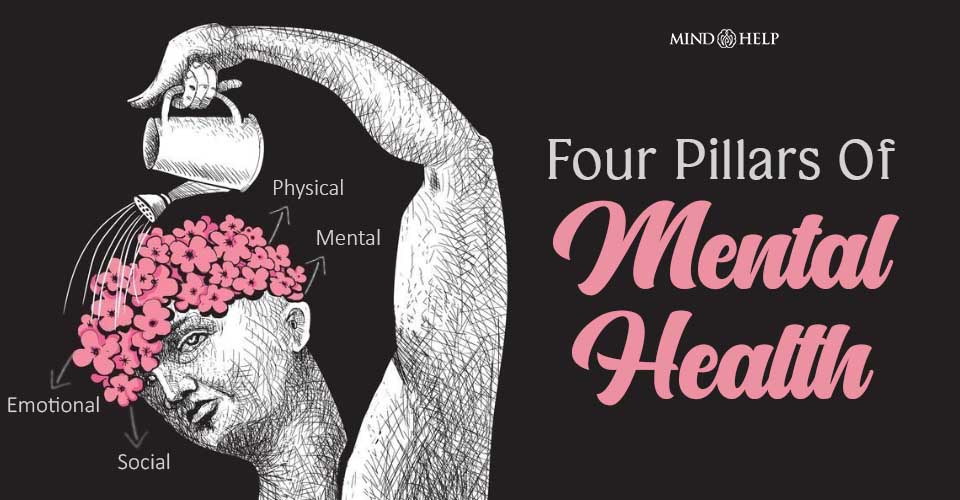Table of Contents
The four pillars of mental health serve as the essential foundation for overall well-being. Each pillar reflects a key aspect of life that, when nurtured consistently, can greatly contribute to a more balanced, resilient, and fulfilling mental health journey.
What Are The Pillars of Mental Health?
The four pillars of mental health encompass 1 Zábó, V., Oláh, A., & Vargha, A. (2022). A new complex mental health test in a positive psychological framework. Frontiers in Psychology, 13. https://doi.org/10.3389/fpsyg.2022.775622 emotional well-being, physical well-being, and social connections. Each pillar plays a vital role in maintaining and promoting quality of life, and they are interconnected, influencing and supporting one another. Among the mental health pillars, mental and emotional 2 Galderisi, S., Heinz, A., Kastrup, M., Beezhold, J., & Sartorius, N. (2015). Toward a new definition of mental health. World psychiatry : official journal of the World Psychiatric Association (WPA), 14(2), 231–233. https://doi.org/10.1002/wps.20231 health is often recognized as the most commonly effective.
These pillars of mental health are deeply interconnected, forming the foundation of overall well-being. Neglecting even one can create a ripple effect, disrupting the balance of the others. That’s why it’s essential to actively support and strengthen each pillar through intentional strategies—ultimately fostering greater resilience, stability, and quality of life.
Four Pillars Of Mental Health
These 4 pillars of mental health represent different aspects 3 Bodeker, G., Pecorelli, S., Choy, L., Guerra, R., & Kariippanon, K. (2020). Well-Being and Mental Wellness. Oxford Research Encyclopedia of Global Public Health. https://doi.org/10.1093/acrefore/9780190632366.013.162 of well-being that are interconnected, which include:
1. Mental Health
This pillar focuses on 4 Galderisi, S., Heinz, A., Kastrup, M., Beezhold, J., & Sartorius, N. (2015). Toward a new definition of mental health. World psychiatry : official journal of the World Psychiatric Association (WPA), 14(2), 231–233. https://doi.org/10.1002/wps.20231 maintaining a healthy mind and cognitive functioning. It involves nurturing positive thoughts, managing stress, and seeking professional help when needed to address mental health conditions.
2. Emotional Health
This pillar emphasizes understanding and managing emotions 5 Stewart-Brown S. (1998). Emotional wellbeing and its relation to health. Physical disease may well result from emotional distress. BMJ (Clinical research ed.), 317(7173), 1608–1609. https://doi.org/10.1136/bmj.317.7173.1608 effectively. It involves developing emotional intelligence, expressing emotions in a healthy way, and building resilience to cope with life’s challenges.
3. Social Health
This pillar highlights the importance of social connections 6 Islam M. M. (2019). Social Determinants of Health and Related Inequalities: Confusion and Implications. Frontiers in public health, 7, 11. https://doi.org/10.3389/fpubh.2019.00011 and relationships. It involves fostering supportive relationships, engaging in social activities, and seeking social support during difficult times.
4. Physical Health
This pillar recognizes the strong connection 7 Warburton, D. E., Nicol, C. W., & Bredin, S. S. (2006). Health benefits of physical activity: the evidence. CMAJ : Canadian Medical Association journal = journal de l’Association medicale canadienne, 174(6), 801–809. https://doi.org/10.1503/cmaj.051351 between physical and mental well-being. It involves exercising regularly, practicing healthy eating habits, prioritizing sufficient sleep, and avoiding harmful substances.

How These Pillars Affect Mental Health Functioning
The impact of the 4 pillars of mental health—varies depending on the specific mental health 8 COMMON MENTAL HEALTH DISORDERS. (2011). Nih.gov; British Psychological Society. Available from: https://www.ncbi.nlm.nih.gov/books/NBK92254/ condition being considered, such as:
1. Stress
Imbalances or challenges in any of these pillars can contribute to increased stress levels 9 Schneiderman, N., Ironson, G., & Siegel, S. D. (2005). Stress and health: psychological, behavioral, and biological determinants. Annual review of clinical psychology, 1, 607–628. https://doi.org/10.1146/annurev.clinpsy.1.102803.144141 . For example, excessive work demands or unresolved emotional issues can lead to mental and emotional stress, while strained relationships or a lack of social support can cause social stress. Neglecting physical health or experiencing health problems can also contribute to physical stress.
Read More About Stress Here
2. Loneliness and Isolation
Prioritizing social engagement, fostering emotional well-being, and nurturing supportive relationships are essential for combating loneliness and promoting a sense of belongingness.
A lack of social connections or difficulties in building and maintaining relationships can lead to feelings of loneliness. Imbalances in emotional health 10 Hutten, E., Jongen, E. M. M., Vos, A. E. C. C., van den Hout, A. J. H. C., & van Lankveld, J. J. D. M. (2021). Loneliness and Mental Health: The Mediating Effect of Perceived Social Support. International journal of environmental research and public health, 18(22), 11963. https://doi.org/10.3390/ijerph182211963 , such as struggles with self-esteem or emotion regulation, can also contribute to a sense of isolation.
Read More About Loneliness Here
3. Depression
Emotional imbalances, such as difficulty regulating emotions 11 McLaughlin K. A. (2011). The public health impact of major depression: a call for interdisciplinary prevention efforts. Prevention science : the official journal of the Society for Prevention Research, 12(4), 361–371. https://doi.org/10.1007/s11121-011-0231-8 or experiencing persistent sadness, are significant factors in depression. Socially, a lack of supportive relationships, social isolation, or feelings of disconnection can exacerbate depressive feelings. Additionally, poor nutrition can also contribute to symptoms of depression.
Read More About Depression Here
4. Body’s Immune System
Mental health influences immune function 12 A, C., Travers, P., Walport, M., & Shlomchik, M. J. (2019). The Immune System in Health and Disease. Nih.gov; Garland Science. https://www.ncbi.nlm.nih.gov/books/NBK10775/ through stress levels, as chronic stress can suppress the immune system and make individuals more susceptible to illnesses.
Emotional well-being and positive social connections have been linked to improved immune response, while physical health, including regular exercise and a healthy lifestyle, can strengthen the immune system.
5. Anxiety
Excessive worry, negative thinking, and irrational beliefs 13 (PDF) Effects of Anxiety on Health and Well-being of the Individuals. (n.d.). ResearchGate. Available from: https://www.researchgate.net/publication/342589861_Effects_of_Anxiety_on_Health_and_Well-being_of_the_Individuals can fuel the symptoms of anxiety. Emotional imbalances, difficulties in managing emotions, or heightened stress sensitivity, contribute to anxiety.
Social factors like a lack of support, social pressures, or isolation can amplify anxiety while neglecting physical health through poor sleep, unhealthy habits, or high-stress levels can altogether worsen mental health.
By nurturing and balancing these four pillars, individuals can have several positive impacts 14 Bradley, C., Cordaro, D. T., Zhu, F., Vildostegui, M., Han, R. J., Brackett, M., & Jones, J. (2018). Supporting improvements in classroom climate for students and teachers with the four pillars of wellbeing curriculum. Translational Issues in Psychological Science, 4(3), 245–264. https://doi.org/10.1037/tps0000162 on their mental health, such as increased resilience and improved ability to cope with difficult situations, enhanced mood, and increased happiness, and improved cognitive abilities such as focus, memory, and problem-solving skills.
Read More About Anxiety Here
Takeaway
The Four Pillars of Mental Health—mental, emotional, social, and physical—are deeply interconnected and vital for overall well-being. Nurturing each pillar plays a key role in promoting optimal mental health. By practicing self-care, fostering healthy relationships, managing emotions effectively, and maintaining physical health, individuals can create a strong foundation for a balanced, resilient, and fulfilling life.
At A Glance
- The four pillars of mental health include emotional, mental, physical, and social well-being.
- Balancing and nurturing each pillar plays a vital role in supporting overall mental health.
- These pillars enhance cognitive functions such as focus, memory, and problem-solving skills.
- Imbalances in any pillar can lead to increased stress, anxiety, or symptoms of depression.
- Prioritizing self-care, building positive relationships, managing emotions, and maintaining physical health are key to living a balanced and fulfilling life.
Frequently Asked Questions (FAQs)
1. What is the DSM 5 mental health?
The DSM-5 is a widely used diagnostic tool in mental health. It provides standardized criteria for diagnosing and categorizing mental health disorders, aiding professionals in assessment, diagnosis, and treatment planning, and promoting a common understanding of mental health conditions.
2. What are the top 5 mental illness?
The top 5 mental illnesses, based on prevalence and impact, include mood disorders (such as depression or bipolar disorder) anxiety disorders, personality disorders, psychotic disorders (such as schizophrenia), and post-traumatic stress disorder (PTSD).
3. What are the 3 levels of mental health?
Mental health can be broken down into three major components: cognitive, emotional, and behavioral.














